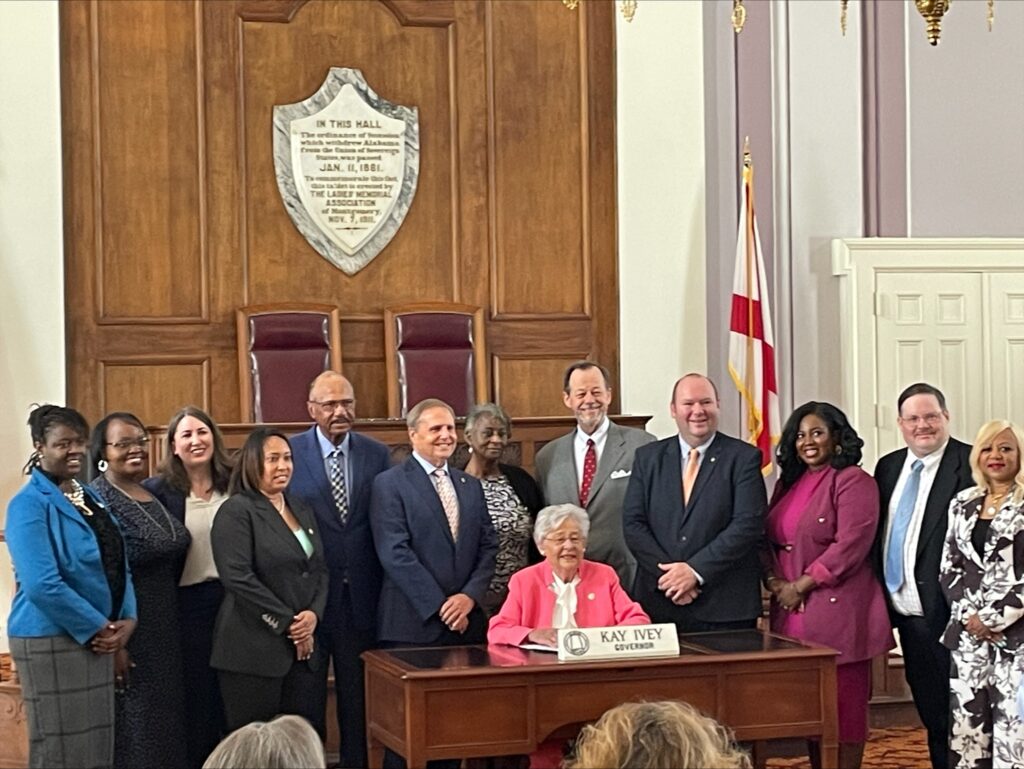
Alabama’s grocery tax reduction now in effect
By Chris Sanders, communications director
Alabama has taken an important first step toward untaxing groceries. HB 479 took effect Sept. 1, reducing the state sales tax on groceries from 4% to 3%. The law will reduce the tax by another percentage point as soon as September 2024, as long as Education Trust Fund (ETF) revenues grow by at least 3.5% over the previous year. This policy change will help families keep food on the table and ease financial strain for Alabamians with low incomes.
The law’s enactment came after decades of persistent advocacy by Alabama Arise members. Several Arise staff members celebrated at a ceremonial bill signing July 20 at the State Capitol in Montgomery. Numerous legislative champions also attended the event, including Sen. Andrew Jones, R-Centre; Reps. Danny Garrett, R-Trussville, and Penni McClammy, D-Montgomery; and former Rep. John Knight, D-Montgomery.
Arise remains committed to eliminating the rest of the state grocery tax responsibly and sustainably. Those efforts will include working with policymakers to protect ETF funding by closing tax loopholes skewed in favor of wealthy households and highly profitable corporations.
Annual meeting to chart Arise’s course for 2024
By Matt Okarmus, communications associate
Grassroots democracy will be on display when Alabama Arise members choose our 2024 legislative priorities at our Annual Meeting on Saturday, Sept. 30. There will be options to meet both in person and online via Zoom.
As a member, you have the power to select the legislative priorities we will pursue in 2024. Two new proposals will compete with five current priorities for five slots on next year’s policy agenda.
Below, you’ll find more information on the Annual Meeting, including a new location this year. You’ll also see member groups’ summaries of the new policy proposals and our policy staff’s overviews of the current legislative priorities. And you’ll see updates on our two permanent priorities: adequate state budgets and tax reform.
We hope to see you in September as we gather to renew our shared commitment to building a better Alabama for all!
Things to know for our Annual Meeting
When:
Saturday, Sept. 30, 2023
10 a.m. to 12:30 p.m.
Where:
This is a hybrid event with options to attend in person as well as remotely via Zoom. The in-person meeting will be at The Legacy Annex, 115 Coosa St., Montgomery, AL 36104. This is the former site of the Equal Justice Initiative’s Legacy Museum. You can find more details and registration information at alarise.org/annualmeeting2023. There is no cost to attend, though donations are welcome.
Voting rules:
Member groups may cast up to 42 votes for legislative priorities. Before the Annual Meeting, groups may designate up to six representatives to get seven votes each. Individual members get five votes each. (A person can vote as an individual or as a member group’s representative, but not both.)
Groups must be current on dues to vote. Individual members must have given between July 1, 2022, and Aug. 31, 2023, to be eligible.
Voting for legislative priorities will be conducted online. Members will present policy proposals during the meeting. Eligible voters will receive a link and instructions after the meeting. If Arise doesn’t have your email, you will receive a postcard with voting information.
For more information:
If you have questions or need to update your contact info or group voters, call 334-832-9060 or email info@alarise.org.
An Arise tradition: the member-led agenda
By Robyn Hyden, executive director
Something interesting is happening in the world of policy organizations. After years of many think tanks working behind the scenes to set their policy agendas with little transparency or buy-in from regular people, many of our peer organizations are now realizing the best policies are those informed by the people closest to the problems.
Research and data analysis have important roles to play in any new policy formulation or advocacy campaign. But they alone can’t tell us what needs to happen to improve conditions on the ground.
Thankfully, Alabama Arise is ahead of the curve. Thirty-five years ago, Arise’s founders knew we couldn’t truly work to advance people-centered policies in Montgomery without actually working with and talking to, well, regular people. That is why we are unique among many of our peers in having a policy agenda driven and guided by our membership and directly impacted people across our state.
Driven and guided by the people
I’m proud that with your support, we’ve invested over the years in listening, fostering community conversations and seeking answers to address economic and social justice from everyday Alabamians. Our Annual Meeting and voting process are an important part of this tradition.
Public policy should not be only the purview of the wealthy, white, well-connected or well-heeled. That kind of thinking has created the problems and inequities we are fighting. Instead, the best policies to address economic hardship and poverty are those driven and guided by the people who are struggling just to get by, and by those working on the front lines to advance justice. Every year we invite you, our members, to vote on our annual legislative agenda to ensure our policy goals align with those of everyday Alabamians.
If you have not yet joined us in this process, I hope you will. Join our 2023 Annual Meeting on Sept. 30 to hear from volunteers and leaders across our state. Then participate in voting to select our 2024 legislative agenda!
Permanent legislative priorities
Tax reform
 Alabama legislators made huge strides toward eliminating the 4% state sales tax on groceries during the 2023 regular session.
Alabama legislators made huge strides toward eliminating the 4% state sales tax on groceries during the 2023 regular session.
This has been a longstanding priority for Alabama Arise. Thanks to the passage of HB 479 and HJR 243, Alabama will:
- Reduce the state grocery tax by 1 cent this September.
- Reduce the tax to 2% as soon as September 2024, assuming projected Education Trust Fund (ETF) revenues grow by at least 3.5% next year.
- Create a commission to study ways to eliminate the final 2 cents while protecting ETF revenue. Ultimately, this change will improve life for Alabamians who are struggling to make ends meet.
In 2023, the Legislature also:
- Passed legislation to give Alabama families a tax refund check of $150 per individual and $300 per family in December 2023.
- Passed legislation to exempt overtime pay from income taxes for the 2024 tax year.
- Phased out some existing tax incentives and required a bi-annual review of incentives.
- Took a step forward toward increasing transparency related to corporate tax incentives.
In addition, Arise was happy to see movement on SB 196, aimed at strengthening the state’s Open Records Act. This bill would have established procedures to request public records and improved public access to them. SB 196 passed the Senate and cleared a House committee, but the House unfortunately did not vote on it. Arise member group Jobs to Move America has urged us to continue advocating for transparency, particularly related to the terms of corporate tax incentive agreements.
Adequate state budgets
 Thanks to federal relief funds, healthy sales and income tax collections, and rapid growth in internet sales tax revenue, Alabama went into 2023 with significant revenue increases despite high inflation and other lingering effects of the COVID-19 recession.
Thanks to federal relief funds, healthy sales and income tax collections, and rapid growth in internet sales tax revenue, Alabama went into 2023 with significant revenue increases despite high inflation and other lingering effects of the COVID-19 recession.
This healthy revenue growth allowed the Legislature to increase education funding and provide educators with a 2% raise. The state likely will have enough money to continue to cover basic needs in its 2025 budgets. Arise will keep calling on policymakers to strengthen investments in vital services. Mental health care is a longtime funding priority that Arise member group Grace Presbyterian Church in Tuscaloosa has urged us to underscore in our ongoing advocacy.
Importantly, lawmakers this year also held a committee hearing to discuss facts about the health coverage gap, and speakers cited Arise and Cover Alabama data. Also worth highlighting is the establishment of a Medicaid Emergency Reserve Fund within the General Fund budget. This reserve fund, capped for now at $100 million, could help Alabama cover more adults with low incomes by retaining savings to Medicaid from enhanced federal funding. Officials could use that money in future years if necessary to help fund increased Medicaid costs.
Advocates this year successfully blocked the PRICE Act, an enormous threat to public school funding. If passed, it could have allowed the diversion of hundreds of millions of dollars from the Education Trust Fund (ETF). The bill would have routed money away from public schools and into the coffers of private, at-home or other alternative education settings instead.
Though thankfully the PRICE Act did not pass this year, we anticipate it will return next year. Also causing quite a stir this session was the Legislature’s decision to allocate $100 million from the ETF to support ongoing prison construction.
In brighter news, the Legislature allocated an additional $10 million over the funding that normally would be provided for schools deemed to be “underperforming.” This money went toward the Turnaround School Initiative to help fund crucial services, including tutoring access and more auxiliary teachers.
Compiled by Akiesha Anderson, policy and advocacy director
New issue proposals
Fund the Alabama Housing Trust Fund
Submitted by Jay Williams, Low Income Housing Coalition of Alabama (LIHCA)
 As Alabama stands at a crossroads, legislation to fund the Alabama Housing Trust Fund (AHTF) presents an opportunity to address poverty in our state. This proposal aims to establish a dedicated funding source for the AHTF by increasing the mortgage record fee from 15 cents per $100 of indebtedness to 30 cents per $100.
As Alabama stands at a crossroads, legislation to fund the Alabama Housing Trust Fund (AHTF) presents an opportunity to address poverty in our state. This proposal aims to establish a dedicated funding source for the AHTF by increasing the mortgage record fee from 15 cents per $100 of indebtedness to 30 cents per $100.
This legislation would generate an estimated $44.8 million for the AHTF and would serve as a catalyst to bridge this gap. It would provide low-income households with affordable housing options. This would help reduce the risk of homelessness and break the cycle of poverty. Moreover, by targeting rural communities, we can work toward leveling the playing field and fostering equitable access to housing opportunities.
Families with low incomes, individuals experiencing homelessness, essential workers, veterans, seniors, and individuals with disabilities all would benefit from increased access to safe and affordable housing. By prioritizing the most vulnerable members of our communities, we can uplift individuals and promote inclusive, prosperous neighborhoods.
The timeline for bill passage depends on the political climate and legislative priorities. However, with dedicated advocacy efforts and effective collaboration, we can expedite the process. Through bipartisan consensus and highlighting the urgent need for affordable housing, we can strive for swift passage in 2024.
Alabama Arise has a crucial role to play in championing AHTF funding. By mobilizing our network of supporters, engaging in grassroots advocacy and fostering alliances with like-minded organizations, we can amplify our collective voice and ensure the successful passage of this legislation.
Now is the time to invest in affordable housing as a long-term solution to address poverty and racial inequality. Funding can be sourced through a combination of public-private partnerships, leveraging federal programs, redirecting existing resources or exploring innovative financing mechanisms. By increasing the mortgage record fee, allocating a portion of community reinvestment funds or exploring tax incentives, we can secure the necessary funding to support the Alabama Housing Trust Fund.
Comprehensive maternal and infant health care reform
Submitted by Courtney Andrews, American Civil Liberties Union (ACLU) of Alabama
 Alabama is a dangerous place to be pregnant and to give birth, particularly for Black and low-resourced women. With the highest maternal mortality rate in the nation, the maternal health crisis is only worsening.
Alabama is a dangerous place to be pregnant and to give birth, particularly for Black and low-resourced women. With the highest maternal mortality rate in the nation, the maternal health crisis is only worsening.
A person’s chance of dying during pregnancy, childbirth or the postpartum period is closely linked to racial identity, social and economic status and the geographic remoteness of the home. Additionally, Alabama has the third-highest mortality rate for cervical cancer. That is unacceptable, considering that cervical cancer is highly preventable, detectable and treatable.
Alabama Arise was successful in pushing policymakers to expand Medicaid for one year postpartum. Now is the time to capitalize on this progress by expanding Medicaid for the general population and introducing a comprehensive reproductive health bill that focuses on ensuring the health and safety of Alabama families more broadly and over the life course.
Such a bill, ideally introduced in the 2025 legislative session, must enshrine elective parenting (the right to choose if and when to have a child). It also should expand the scope of practice for midwives and provide a path to licensure for birth centers. And it should expand access to comprehensive prenatal, birth and postpartum care, including screenings and treatment for depression.
This bill should require a greater statewide investment in community-based organizations that assist pregnant and birthing people, as well as in housing, transportation and access to healthy food. It also should require public schools to provide comprehensive sexual health education and greater access to the HPV vaccine for school-age children. The bill also should include provisions for the care and safe birthing conditions of incarcerated people (i.e., not being shackled during birth).
Current legislative priorities
Criminal justice reform
 Arise was happy to partner with Alabama Appleseed in achieving a major victory this year related to fines and fees. The Legislature passed SB 154, which limits the circumstances under which the state can suspend driver’s licenses. This new law will curb the practice of immediately suspending driver’s licenses when people are unable to afford to pay traffic tickets.
Arise was happy to partner with Alabama Appleseed in achieving a major victory this year related to fines and fees. The Legislature passed SB 154, which limits the circumstances under which the state can suspend driver’s licenses. This new law will curb the practice of immediately suspending driver’s licenses when people are unable to afford to pay traffic tickets.
Other legislation also made significant progress through the Legislature before eventually falling short this session. That included HB 229, a “second chance” bill to reform the state’s Habitual Felony Offender Act, aka the “three-strikes” law. We were encouraged to see this legislation pass the House and make it out of the Senate Judiciary Committee this year. Arise expects to see and support similar legislation next year.
In addition to the above legislation, Arise member group Represent Justice has proposed expanding our scope of work in this area to include efforts to reform Alabama’s felony murder law. Under this law, a person can be convicted of first-degree murder even if they did not intend to or did not actually kill anyone. A disproportionate share of people convicted under felony murder laws are people of color, research from several states has found. Represent Justice urges support for legislation to clarify the circumstances under which felony murder may be charged and to make other related changes.
Death penalty reform
 For the first time in years, lawmakers in 2023 debated legislation to address Alabama’s unjust death penalty laws. Alabama is one of only two states to permit the issuance of death sentences via non-unanimous jury sentencing decisions. Arise this year supported HB 14, which would have aligned the state with the national trend of requiring a unanimous jury verdict prior to imposing the death penalty.
For the first time in years, lawmakers in 2023 debated legislation to address Alabama’s unjust death penalty laws. Alabama is one of only two states to permit the issuance of death sentences via non-unanimous jury sentencing decisions. Arise this year supported HB 14, which would have aligned the state with the national trend of requiring a unanimous jury verdict prior to imposing the death penalty.
This bill also would have applied the state’s 2017 ban on judicial override retroactively. This ban forbids judges from imposing a death sentence when the jury recommends a lesser sentence. Unfortunately, when passed in 2017, the law didn’t apply to people already on death row. That has left more than 30 people on Alabama’s death row who received a death sentence against their jury’s will.
The House Judiciary Committee heard HB 14 too late for it to have a chance to become law. But Arise was proud to see member groups like Project Hope to Abolish the Death Penalty give compelling and moving testimony during a public hearing in support of the bill. We hope to see this legislation reintroduced and considered earlier in the session next year.
Payday and title lending reform
 Every year, high-interest loans trap thousands of struggling Alabamians in a cycle of deep debt. Payday loans are short-term (usually two-week) loans charging high annual percentage rates (APRs), most commonly 456%. Auto title loans charge up to 300% APR and also carry the risk of repossession of the vehicle. Alabama also has no title loan database, leaving the extent of harm from these loans unknown.
Every year, high-interest loans trap thousands of struggling Alabamians in a cycle of deep debt. Payday loans are short-term (usually two-week) loans charging high annual percentage rates (APRs), most commonly 456%. Auto title loans charge up to 300% APR and also carry the risk of repossession of the vehicle. Alabama also has no title loan database, leaving the extent of harm from these loans unknown.
These high-cost loans strip wealth from borrowers and hurt communities. As of this time last year, payday lenders were on track to pull approximately $1 billion in fees out of Alabama communities over the next decade, with most of that money flowing to out-of-state companies. Predatory lending practices continue to target people of color disproportionately. These practices exacerbate the economic challenges in many struggling rural and urban areas.
A House member introduced legislation this year in an effort to reduce the harms of high-cost payday lending. But the bill unfortunately did not come up in committee. If passed, this legislation effectively would cut the interest rates on payday loans in half by giving borrowers more time to pay them back. We anticipate that similar legislation will be introduced next year.
Public transportation
 State leaders are finally starting to take note of the negative implications that a lack of access to reliable transportation has on advancing many statewide goals, including increasing workforce participation. Arise has long acknowledged that robust state investment into public transportation would improve the quality of life for many Alabamians. Transit availability affects people across geographies, incomes and races. Yet Alabama remains one of only a few states without state funding for public transportation.
State leaders are finally starting to take note of the negative implications that a lack of access to reliable transportation has on advancing many statewide goals, including increasing workforce participation. Arise has long acknowledged that robust state investment into public transportation would improve the quality of life for many Alabamians. Transit availability affects people across geographies, incomes and races. Yet Alabama remains one of only a few states without state funding for public transportation.
The Legislature took steps to remedy this by creating the Public Transportation Trust Fund (PTTF) in 2018. However, the law did not provide an initial appropriation or dedicated funding source. If funded, the PTTF could jump-start increased federal investment that requires non-federal matching dollars.
Arise urged state leaders to invest $20 million of Alabama’s remaining American Rescue Plan Act funds into the PTTF. But those efforts came up short in the last year. Even so, Arise will continue to explore ways to convince lawmakers that investing in the PTTF will allow the state to improve quality of life for everyone. Our policy team plans to produce a report on the state of public transit in Alabama. And the Montgomery Transportation Coalition, an Arise member group, has urged support for a proposal to help fund public transit through a $1 assessment on license plates.
Voting rights
 Arise and advocacy partners this year successfully blocked legislation that posed a threat to voting rights in Alabama. HB 209 would have criminalized many efforts to assist voters with absentee ballot applications or completed ballots. While we are happy this bill did not pass, we anticipate that it will be reintroduced next year.
Arise and advocacy partners this year successfully blocked legislation that posed a threat to voting rights in Alabama. HB 209 would have criminalized many efforts to assist voters with absentee ballot applications or completed ballots. While we are happy this bill did not pass, we anticipate that it will be reintroduced next year.
This session, lawmakers considered legislation to make absentee voting easier. The bill would have eliminated the requirement to complete an affidavit when submitting an absentee ballot. Though this legislation ultimately did not make it out of the House Constitution, Campaigns and Elections Committee, it was significant that a bill to make voting access easier received committee discussion.
This year also saw continued efforts to improve the voting rights restoration process for people who previously lost their right to vote due to a felony conviction. A restoration bill passed the Senate and made it to the House Judiciary Committee. Unfortunately, the sponsors then had to make a strategic decision to table the bill due to alarming amendments and modifications during the legislative process. We look forward to working with the bill’s sponsors and other advocates to strategize ways to help get this legislation over the finish line next year.
Compiled by Akiesha Anderson, policy director; Carol Gundlach, senior policy analyst; Dev Wakeley, worker policy advocate; Mike Nicholson, senior policy analyst
Arise thrives on its membership
By Jacob Smith, advancement and operations director
When you give to Alabama Arise, you join as a member. We’re grateful for your giving: A significant percentage of our financial support comes from people like you. And we’re especially grateful for your membership.
Our members are important to us because, as we often say, people are our power. This month, members are coming together at our Annual Meeting to vote on our legislative priorities, approve our budget and elect our board of directors.
Because of this, we like to report regularly on who our members are. We have 1,412 members across the state in nearly three-quarters of Alabama counties. Through our membership survey (which you can fill out at bit.ly/alarise), we know our membership is 22% people with low incomes, 5% people under age 30 and 23% people of color.
Part of this membership is a dedicated group who sustain our work year-round. These are our recurring donors. More than 200 people give monthly to Arise, because they know it’s important for us to have the flexibility needed to focus year-round on the priorities our members choose.
Will you join this dedicated group? Visit alarise.org/donate to set up a recurring gift online or to access the monthly bank transfer form. Thank you for being a member!
Medicaid expansion would help working Alabamians
By Whitney Washington, communications associate
Medicaid expansion is a proven solution to help people join and stay in the workforce, a new report from Community Catalyst spotlights. States that have expanded Medicaid have seen a greater increase in labor force participation among people with incomes below 138% of the poverty line than states – like Alabama – that have not expanded.
“Every Alabamian should be able to get the medical care they need to survive and thrive,” said Debbie Smith, Alabama Arise’s Cover Alabama campaign director. “Removing financial barriers to health care would make our workforce more robust and more productive. It’s time for Alabama policymakers to close the health coverage gap and invest in a healthier future for our state and for our people.”
Nearly half of Alabama workers do not get employer-sponsored health insurance, the Catalyst report finds. This forces tens of thousands of Alabama families to make tough decisions, either to forgo needed health care or take on thousands of dollars of medical debt. When Alabamians are delaying the care and treatment they need, that hurts their productivity and their well-being.
The need for expansion is especially urgent right now as state officials unwind COVID-19 pandemic-era Medicaid policies, leaving about 61,000 Alabamians at risk of losing their Medicaid. Without Medicaid expansion in the state, many more individuals and families will be left with no options for affordable health coverage.
Closing Alabama’s coverage gap could create an average of 20,083 new jobs per year and have an estimated positive economic impact of $11.36 billion over the next six years. Medicaid expansion would be one key solution to improving workforce participation across the state.
Welcome, Adam!
 Adam Keller joined Alabama Arise as our northeast Alabama organizer in August. A lifelong Southerner, he has spent more than a decade as an activist and organizer in north Alabama and has been involved in a variety of campaigns and organizations fighting for the better Alabama that is not only possible, but necessary. Adam is a former high school history teacher and spent more than five years representing educators in Huntsville. He is a union stagehand with IATSE 900 and is proud to volunteer for his local and the North Alabama Labor Council. He holds a B.S. in social science from Athens State University.
Adam Keller joined Alabama Arise as our northeast Alabama organizer in August. A lifelong Southerner, he has spent more than a decade as an activist and organizer in north Alabama and has been involved in a variety of campaigns and organizations fighting for the better Alabama that is not only possible, but necessary. Adam is a former high school history teacher and spent more than five years representing educators in Huntsville. He is a union stagehand with IATSE 900 and is proud to volunteer for his local and the North Alabama Labor Council. He holds a B.S. in social science from Athens State University.
Other staff moves
We also celebrate two additional role changes. Jacob Smith is initiating a new role as our advancement and operations director after serving as development director since 2022. Mike Nicholson has been promoted to senior policy analyst after moving to the policy team in 2022.



